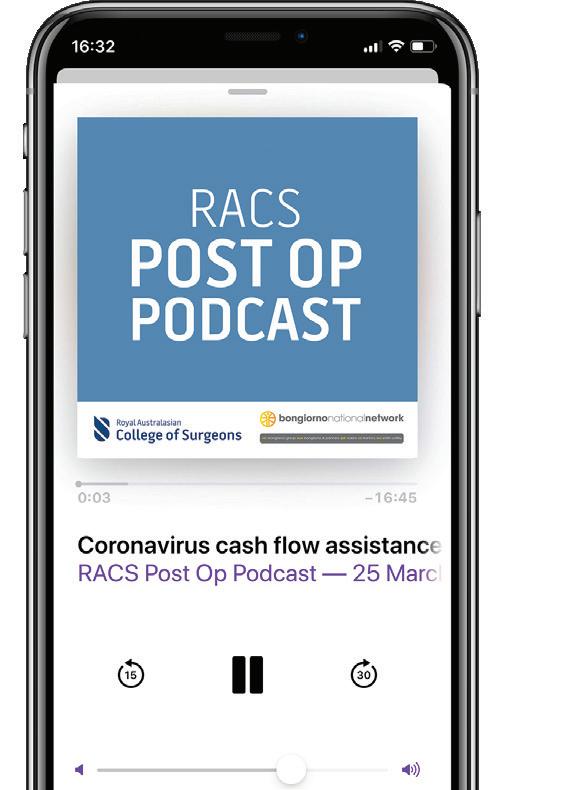
5 minute read
Advocacy update
Read on for a list of some of our recent advocacy work.
Pregnancy warning labels for alcoholic beverages
Advertisement
The College is pleased to share that alcohol bottles will need to display a prominent warning label outlining the dangers of drinking while pregnant. This will become mandatory across Australia and New Zealand following a decision by the governments of both countries in July. New Zealand and Australia, which have a joint food regulation system and share food standards for labelling, currently have voluntary labelling of alcoholic beverages with health warnings about not drinking alcohol while pregnant. Following this decision, manufacturers will now have three years to implement a standard pregnancy warning on alcoholic beverages. For bottles larger than 200 millilitres, the standard labels will have black, white and red text stating “PREGNANCY WARNING: Alcohol can cause lifelong harm to your baby.” Smaller bottles will need to display the pictogram, which will be required to print a picture that also uses the black, white and red colour scheme. RACS firmly believes the alcohol warning labels will significantly improve community awareness of the risks of drinking alcohol throughout pregnancy, and will result in fewer babies born with fetal alcohol spectrum disorder in years to come. We would like to thank the Trauma Committee and the many Fellows who have contributed to our advocacy efforts against the harmful effects of alcohol and illicit drugs over many years. RACS congratulates the Australian and New Zealand governments for taking strong leadership in this area, despite vocal opposition from the alcohol industry. We also acknowledge the hard work of the Foundation for Alcohol Research and Education (FARE) and other like
minded organisations, as well as the many practitioners and researchers who campaigned for this reform.
Health arrangements in natural disasters
In April, RACS made a submission to the Royal Commission into National Natural Disaster Arrangements. The Commission subsequently released an issues paper for public comment. The issues paper explores some of the health and mental health arrangements in relation to natural disasters in Australia. It provides an overview of Australia’s health care arrangements and discusses the role of primary care providers, the health effects of bushfire smoke, and whether there is a need for greater research into any particular health effects of natural disasters. The paper poses six questions on which the Commission invited comments and submissions from the community, and particularly encourages health care providers, health policy departments and agencies, researchers, emergency coordinators and practitioners to provide their views. RACS sent a submission to the Commission in June, in which we expanded our initial submission from April. The response also made additional recommendations in relation to research priorities and communication strategies. The full submission is available on the RACS website.
First meeting of the new RACS Advocacy Working Groups
In the first week of June, both the Sustainability in Health Care Working
Group (SIHCWG), led by Chair, Professor Mark Frydenberg, and the Environmental Sustainability in Surgical Practice Working Group (ESSPWG), led by Professor David Fletcher, held their inaugural meetings via videoconference. Members of each working group were asked to rank their priorities prior to each meeting, which formed the basis for the following set of collective priorities for each group. SIHCWG priorities 1. Cost of surgery and out-of-pocket expenses 2. Outcomes data 3. Private health insurance sustainability ESSPWG priorities 1. Reduce rubbish produced in operating theatres by reusing, recycling and reducing excess use of disposables.
Influence hospital procurement programs by developing College guidelines (similar to ‘Greening the OR’). 2. Develop advisory role within the
Therapeutic Goods Administration to approve the more environmentally
responsible medical devices and equipment. 3. Advocate to state, territory and federal governments on sustainability. 4. Advocacy to governments on the health implications of climate change, both alone and in conjunction with other
Colleges. In addition to the above priorities, a key focus of the ESSPWG will be to continue to review and update the College’s Position Paper on ‘Reduce, Reuse, Recycle, Rethink, Research’ to provide more specific guidelines (as developed by Australian and New Zealand College of Anaesthetists). The Working Group also discussed a recent submission to the Australian Prime Minister from medical professionals titled ‘Climate Change Statement Australian Health Professionals (Post Covid 19 Health Recovery)’. The Working Group expressed its support for this submission. The SIHCWG agreed to develop a list of three or four key policy and advocacy projects to work on for the remainder of the year. In addition to this, the Working Group will also take the lead in promoting telehealth advocacy as well as responding to the Council of Australian Governments and Victorian Health Department Protection of Title consultation. The terms of reference for both working groups allow extra members from both inside and outside RACS to be co-opted for specific issues. They also encourage extensive involvement with specialist societies and associations, and various other RACS committees, such as the Rural Surgery Section, the Surgical Oncology Section, and the New Zealand Board and state and territory committees.
A civilian surgeon is taken from his routine practice in Sydney, Australia, and finds that military surgery in war zones distressed by civil war, humanitarian disasters and battlefield conflict is very different from the comforts of home and civilian surgery.


AVAILABLE TO PURCHASE AT BOOKDEPOSITORY.COM
RACS Post Op podcasts
Check out the interviews with some of the most inspiring and forward-thinking industry professionals. Developed by RACS, the Post Op Podcasts feature extended interviews on the latest research across the medical industry, as well as practical advice that surgeons can implement in their practices, such as insights on financial management, wealth creation, legal and tax advice and economic forecasts. You can subscribe to the fortnightly RACS Post Op Podcasts on Apple's iTunes or, for those with other smartphone models, on Stitcher.

Listen on iTunes
Search ‘RACS Post Op’ in the Podcast app on iPhone or in iTunes on desktop
Listen on Stitcher
Search ‘RACS Post Op Podcast’ on stitcher.com







